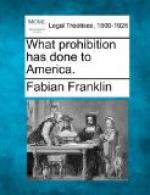the case. But from every standpoint the way in
which the Eighteenth Amendment was actually put through
Congress and the Legislatures has a great deal to
do with the case. Prohibitionists constantly
point to the big majority in Congress, and the promptness
and almost unanimity of the approval by the Legislatures,
as proof of an overwhelming preponderance of public
sentiment in favor of the Amendment. It is proof
of no such thing. To begin with, nothing is more
notorious than the fact that a large proportion of
the members of Congress and State Legislatures who
voted for the Prohibition Amendment were not themselves
in favor of it. Many of them openly declared
that they were voting not according to their own judgment
but in deference to the desire of their constituents.
But there is not the slightest reason to believe that
one out of twenty of those gentlemen made any effort
to ascertain the desire of a majority of their constituents;
nor, for that matter, that they would have followed
that desire if they had known what it was. What
they were really concerned about was to get the support,
or avoid the enmity, of those who held, or were supposed
to hold, the balance of power. For that purpose
a determined and highly organized body of moderate
dimensions may outweigh a body ten times as numerous
and ten times as representative of the community.
The Anti-Saloon League was the power of which Congressmen
and Legislaturemen alike stood in fear. Never
in our political history has there been such an example
of consummately organized, astutely managed, and unremittingly
maintained intimidation; and accordingly never in
our history has a measure of such revolutionary character
and of such profound importance as the Eighteenth
Amendment been put through with anything like such
smoothness and celerity. The intimidation exercised
by the AntiSaloon League was potent in a degree far
beyond the numerical strength of the League and its
adherents, not only because of the effective and systematic
use of its black-listing methods, but also for another
reason. Weak-kneed Congressmen and Legislaturemen
succumbed not only to fear of the ballots which the
League controlled but also to fear of another kind.
A weapon not less powerful than political intimidation
was the moral intimidation which the Prohibition propaganda
had constantly at command. That such intimidation
should be resorted to by a body pushing what it regards
as a magnificent reform is not surprising; the pity
is that so few people have the moral courage to beat
back an attack of this kind. Throughout the entire
agitation, it was the invariable habit of Prohibition
advocates to stigmatize the anti-Prohibition forces
as representing nothing but the “liquor interests.”
The fight was presented in the light of a struggle
between those who wished to coin money out of the
degradation of their fellow-creatures and those who
sought to save mankind from perdition. That the
millions of people who enjoyed drinking, to whom it




